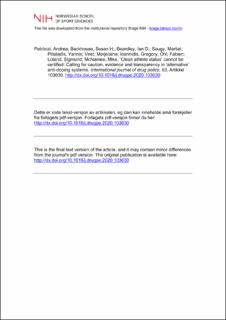| dc.contributor.author | Petróczi, Andrea | |
| dc.contributor.author | Backhouse, Susan H. | |
| dc.contributor.author | Boardley, Ian D. | |
| dc.contributor.author | Saugy, Martial | |
| dc.contributor.author | Pitsiladis, Yannis | |
| dc.contributor.author | Viret, Marjolaine | |
| dc.contributor.author | Ioannidis, Gregory | |
| dc.contributor.author | Ohl, Fabien | |
| dc.contributor.author | Loland, Sigmund | |
| dc.contributor.author | McNamee, Mike | |
| dc.date.accessioned | 2021-11-09T08:28:54Z | |
| dc.date.available | 2021-11-09T08:28:54Z | |
| dc.date.created | 2020-12-03T10:35:09Z | |
| dc.date.issued | 2020 | |
| dc.identifier.citation | International journal of drug policy. 2020, 93(July 2021), Artikkel 103030. | en_US |
| dc.identifier.issn | 0955-3959 | |
| dc.identifier.uri | https://hdl.handle.net/11250/2828506 | |
| dc.description | I Brage finner du siste tekst-versjon av artikkelen, og den kan inneholde ubetydelige forskjeller fra forlagets pdf-versjon. Forlagets pdf-versjon finner du på www.sciencedirect.com / In Brage you'll find the final text version of the article, and it may contain insignificant differences from the journal's pdf version. The original publication is available at www.sciencedirect.com | en_US |
| dc.description.abstract | Athletes, sponsors and sport organisations all have a vested interest in upholding the values of clean sport. Despite the considerable and concerted efforts of the global anti-doping system over two decades, the present system is imperfect. Capitalising upon consequent frustrations of athletes, event organisers and sponsors, alternative anti-doping systems have emerged outside the global regulatory framework. The operating principles of these systems raise several concerns, notably including accountability, legitimacy and fairness to athletes. In this paper, we scrutinise the Clean Protocol™, which is the most comprehensive alternative system, for its shortcomings through detailed analysis of its alleged logical and scientific merits. Specifically, we draw the attention of the anti-doping community – including researchers and practitioners – to the potential pitfalls of using assessment tools beyond the scope for which they have been validated, and implementing new approaches without validation. Further, we argue that whilst protecting clean sport is critically important to all stakeholders, protocols that put athletes in disadvantageous positions and/or pose risks to their professional and personal lives lack legitimacy. We criticise the use of anti-doping data and scientific research out of context, and highlight unintended harms that are likely to arise from the widespread implementation of such protocols in parallel with – or in place of – the existing global anti-doping framework. | en_US |
| dc.language.iso | eng | en_US |
| dc.subject | clean sport | en_US |
| dc.subject | anti-doping | en_US |
| dc.subject | athlete biological passport | en_US |
| dc.subject | doping attitude | en_US |
| dc.subject | whereabouts | en_US |
| dc.subject | therapeutic use exemption | en_US |
| dc.subject | testing | en_US |
| dc.subject | athlete | en_US |
| dc.subject | athlete support personnel | en_US |
| dc.subject | athlete entourage | en_US |
| dc.title | ‘Clean athlete status’ cannot be certified: Calling for caution, evidence and transparency in ‘alternative’ anti-doping systems | en_US |
| dc.type | Peer reviewed | en_US |
| dc.type | Journal article | en_US |
| dc.description.version | acceptedVersion | en_US |
| dc.source.pagenumber | 7 | en_US |
| dc.source.journal | International journal of drug policy | en_US |
| dc.identifier.doi | 10.1016/j.drugpo.2020.103030 | |
| dc.identifier.cristin | 1855674 | |
| dc.description.localcode | Institutt for idrett og samfunnsvitenskap / Department of Sport and Social Sciences | en_US |
| cristin.ispublished | true | |
| cristin.fulltext | postprint | |
| cristin.qualitycode | 1 | |
